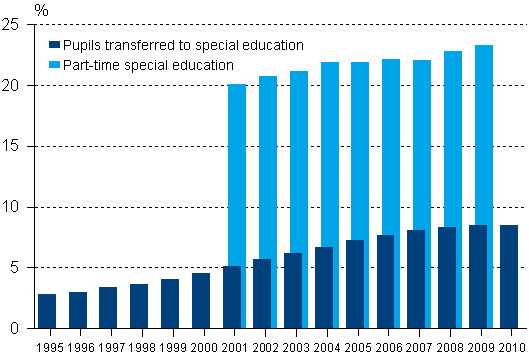Published: 9 June 2011
Number of pupils transferred to special education unchanged, small increase in part-time special education
Eight-and-a-half per cent of comprehensive school students, or over 46,700 pupils, had been transferred to special education in autumn 2010. The share was unchanged from the previous year. In all, 23.3 per cent of pupils, or 128,700 comprehensive school students received part-time special education during the 2009-2010 academic year. The number of pupils attending part-time special education grew by half a percentage point from the previous year. These data derive from Statistics Finland’s Education Statistics.
Shares of pupils transferred to special education and receiving part-time special education among all comprehensive school pupils 1995-2010, % 1)

1) Comparable data on part-time special education are available for the 2001-2009 period (year 2009 referring to the 2009-2010 academic year). The numbers of pupils transferred to special education and recipients of part-time special education cannot be added together because some of the pupils transferred to special education also receive special teaching part-time.
The share of pupils transferred to special education was highest in the region of Päijät-Häme, where it was 10.5 per cent. The number of pupils transferred to special education was lowest in the region of Åland, three per cent of pupils. Compared with the number of pupils, the number of pupils receiving part-time special teaching was highest in the region of Etelä-Savo, over 27 per cent. No part-time special education was arranged in the region of Åland.
Altogether 11.5 per cent of boys and 5.5 per cent of girls had been trans-ferred to special education. Twentyseven per cent of boys and 19 per cent of girls attended part-time special education during the 2009-2010 academic year.
In 2010, 30 per cent of those transferred to special education were fully and 24 per cent partially integrated into groups attending general education. In all, 32 per cent of those transferred to special education received teaching in special groups in comprehensive schools and 14 per cent in special schools. Special education was arranged in general education groups more often than in the previous year. Instead, the number of pupils studying in special schools and in special groups decreased.
During 2009, a total of 18,300 students in vocational education leading to a qualification received special teaching. Their number is 1,800 higher than the year before. The share of special students was 6.5 per cent among all vocational education students and 13.4 per cent among those attending vocational education aimed at young persons.
Source: Education. Statistics Finland
Inquiries: Riikka Rautanen (09) 1734 2375, koulutustilastot@stat.fi
Director in charge: Jari Tarkoma
Publication in pdf-format (255.5 kB)
- Tables
-
Tables in databases
Pick the data you need into tables, view the data as graphs, or download the data for your use.
Appendix tables
- Appendix table 1. Comprehensive school pupils transferred to special education in 1995-2010 (9.6.2011)
- Appendix table 2. Comprehensive school pupils transferred to special education by place of provision of special education in 2010 (9.6.2011)
- Appendix table 3. Comprehensive school pupils transferred to special education by teaching arrangements in 2010 (9.6.2011)
- Appendix table 4. Comprehensive school pupils transferred to special education by ground for decision of acceptance or transfer in 2010 (9.6.2011)
- Appendix table 5. Comprehensive school pupils receiving part-time special education in the academic year 2009-2010 by primary reason for special education 1) (9.6.2011)
- Appendix table 6. Special students in vocational education by place of provision of special education in 2004-2009 (9.6.2011)
Updated 9.6.2011
Official Statistics of Finland (OSF):
Support for learning [e-publication].
ISSN=1799-1617. 2010. Helsinki: Statistics Finland [referred: 15.2.2026].
Access method: http://stat.fi/til/erop/2010/erop_2010_2011-06-09_tie_001_en.html

